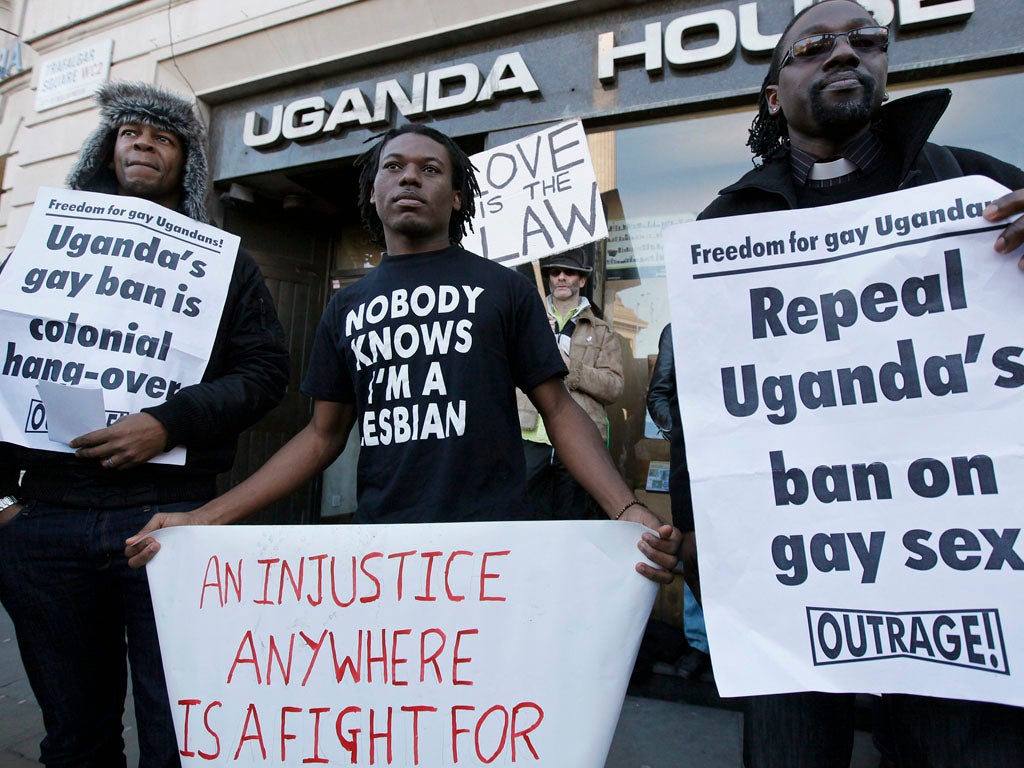All over the world, states inflict appalling suffering on gay people
And hostility isn't fading in the UK as quickly as me may want to imagine

Your support helps us to tell the story
From reproductive rights to climate change to Big Tech, The Independent is on the ground when the story is developing. Whether it's investigating the financials of Elon Musk's pro-Trump PAC or producing our latest documentary, 'The A Word', which shines a light on the American women fighting for reproductive rights, we know how important it is to parse out the facts from the messaging.
At such a critical moment in US history, we need reporters on the ground. Your donation allows us to keep sending journalists to speak to both sides of the story.
The Independent is trusted by Americans across the entire political spectrum. And unlike many other quality news outlets, we choose not to lock Americans out of our reporting and analysis with paywalls. We believe quality journalism should be available to everyone, paid for by those who can afford it.
Your support makes all the difference.The Ashley Madison infidelity website, an online sex exchange, is used by millions of men and women. To many of us, the business seems a little creepy and distasteful. But the moral vigilantes who hacked into the site and published names, addresses and identities of users are truly horrible. They have callously invaded private lives, disclosing deep secrets. The data dump will lead to personal violence and, worse, state brutality in some parts of the world. Gay people are most at risk.
Last week I was in the Scottish parliament discussing the Commonwealth with its Secretary General, Kamalesh Sharma, an urbane Indian diplomat. In this post-colonial club headed by the Queen, 42 out of 53 member states outlaw and victimise gay people. I asked why such extreme laws were tolerated and the justifications came thick and fast – culture, religion, history, pragmatism. (Remember, the British made homosexuality illegal across the empire and the prohibitions remain in place in India and elsewhere.) Homosexuality is banned in some non-Commonwealth nations, too. In Saudi Arabia and Iran, for example, those suspected of being gay are executed, usually without due process.
Don’t assume such hostilities are fully receding in the UK. Gay people have equal rights, live openly and freely, but among most ethnic communities, foul anti-gay attitudes fester and those who come out are humiliated, isolated, forced into heterosexuality, “cleansed”, crushed. Black and Asian Britons rightly fight for respect, for race and religious equality but do not always extend those rights and respect to gay people. Homosexuality to them is a highly infectious Western disease, a plague which must be eradicated.
White Britons, including clerics, can be just as unaccepting and unforgiving of homosexual love and sex. But recent annual social attitudes surveys show that the number of people with such prejudices is declining. That positive change is not happening in black and Asian communities. If anything, as wider society becomes more relaxed about sexual preferences, it is becoming harder for gay people of colour.
Over the past few years, I seem to have become an involuntary agony aunt for many who read my stuff or watch me on TV. They tell me their often very painful stories. Many missives are unsigned. They come from all racial groups, but the majority are from troubled young Asian, black and Arab Britons. And a significant number of them are gay. Mansoor’s story is tragic: “I knew I was gay from the age of 10 but could tell no one. My Pakistani family would go crazy if they knew. I went to work away from my home town and could be myself. Without telling me, they arranged a marriage with a Kashmiri girl. I went through with it, did my duty. But I am HIV positive. And now she is too. I destroyed her life. They made me do this.”
A Sikh accountant, a female Iranian artist, an Afro-Caribbean bank worker – many more, are as tormented. They are riddled with guilt, shame, self-revulsion. Some have had breakdowns. One young woman tried to kill herself after she was found in bed with her girlfriend: “They say I am not their daughter but dirty, the devil, that I should die.” Parental love here is conditional, withheld or withdrawn. In 2014, a Harley Street doctor, Nazim Mahmood, 34, told his Pakistani mother he was gay. She was revolted and told him to get himself “cured”. He jumped off a balcony. That suicide got into the news. Most don’t.
Asian and Arab families fear sexuality and desire. Choice is chaos. The purpose of sex is procreation within strict conventions, maintained by unbending social rules and selected religious doctrine. Africans and Afro-Caribbeans are more sexually liberated in some ways but homosexuality is seen as an extreme deviation. The churches push against it as does the strong macho culture.
At long last, robust action is being taken against forced marriages, female genital mutilation and other human rights violations. But the systemic coercion and oppression of gay black and Asian people is left unchecked.
A Channel 4 documentary tonight follows three devout Muslims who are gay and drag queens. Asif Quraishi, one of them, has had death threats and fears more ostracisation: “The reality is South Asian communities and African communities do have inherent homophobia.” That is some understatement. Human rights organisations and politicians must confront this abuse and terrible bigotry. If they don’t, they are complicit.
Join our commenting forum
Join thought-provoking conversations, follow other Independent readers and see their replies
Comments